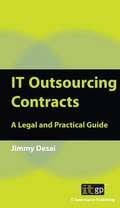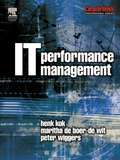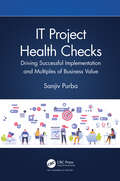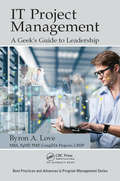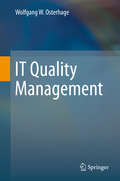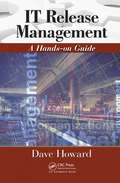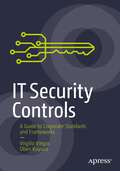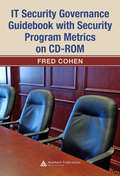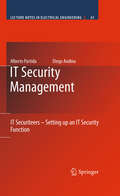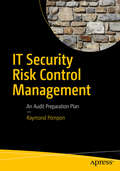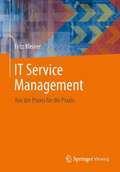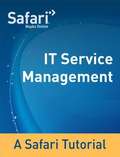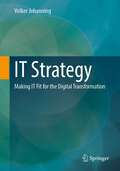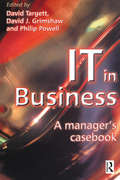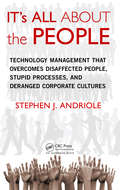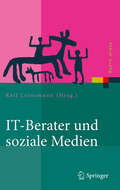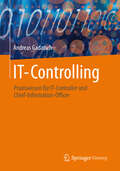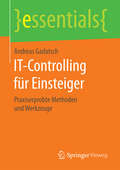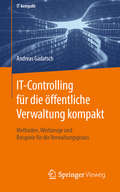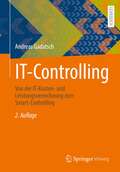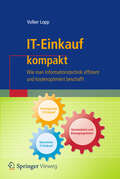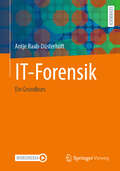- Table View
- List View
IT Outsourcing Contracts: A Legal and Practical Guide
by Jimmy DesaiThis book provides an overview of the IT outsourcing relationshipand life cycle. The process begins with an organizationconsidering whether or not IT outsourcing would be of benefit andthen the issues which would need to be considered in order toanswer this question accurately are discussed. If an organizationbelieves that an IT outsourcing deal could be of benefit, it willthen need to choose a suitable supplier to perform its IToutsourcing. The issues to consider regarding an IT supplier arealso set out in this book. Having selected an IT supplier, anorganization will then need to agree key terms (includingidentifying and agreeing any contentious issues which are so-called deal breakers). Agreeing the IT outsourcing contract isnot the end but the start of the IT outsourcing relationship andthis relationship will need to be managed and developed over thecourse of the contract. Sooner or later the IT outsourcingarrangement will have to come to an end and so an exit plan willneed to be formulated and implemented. This life cycle needs tobe fully understood by anyone involved in this kind of IToutsourcing transaction and this book provides useful informationabout this life cycle.
IT Performance Management
by Peter Wiggers Maritha de Boer-de Wit Henk KokIT Performance Management addresses the way organizations should balance the demand and the supply of information technology, optimizing the cost and maximizing the business value of IT.In this book several aspects of IT performance management are described. The way this management is executed and the techniques, which should be used, depend on the maturity of the relationship between the IT function and the lines of business of an organization. The foundation of the authors' approach is based on the flow of money and related management objectives. However, performance management is primarily based on perceptions. Therefore, this book introduces the IT value perception model. This model describes four separate levels of perception for the business value of IT. If the demand and the supply of IT do not share the same perception level, the balance is lost, which will lead to friction and inefficiency within an organization. This book is not about what is good or what is bad, but rather is about the 'what', the 'why' and to a limited extent the 'how' of managing the performance of IT. Therefore, the book finishes with a 'back-to-business' section in which a self-assessment checklist, a potential growth path and ten next steps are provided. This enables the reader to start applying this book in his every day working environment immediately. IT Performance Management: * Provides an overview of best practices and available thinking on the subject of IT cost and value* Describes the subject of IT cost and value related to management issues on IT strategy, portfolio management, service management, architecture and sourcing * Addresses differing degrees of maturity between IT and the business, illustrated by case studies
IT Planet - Information Technology Book class 9 (Code - 402) - GSTB
by Davinder Singh MinhasThe book “Information Technology 9” is a comprehensive guide designed for Class 9 students, aligned with the CBSE curriculum. It covers a range of topics essential for building foundational IT skills, including employability skills such as communication and self-management, as well as specific IT competencies like data entry, digital documentation, electronic spreadsheets, and digital presentations. The book adopts a step-by-step approach, integrating theoretical knowledge with practical exercises, real-life projects, and application-based questions, making it an effective resource for students to develop technical skills necessary for future employment.
IT Planet Petabyte Class 8
by PM Publishers Pvt. Ltd.The Petabyte book is based on the latest software packages and operating system programs such as Microsoft Office 2019 and Windows 10. Apart from these two, author has covered latest software programs such as Scratch, Stykz, Animate, Photoshop, Spark, MIT App Inventor and Python. To produce a visually appealing and easy to understand book, the author has artfully combined the latest technology, pictures, drawings and text in this series. Most of the pictures in this series show a step-by-step pedagogy, which simplifies the more complex computer concepts. The terms and examples described in this series are those which everyone will come across while using computers in school as well as at home.
IT Project Health Checks: Driving Successful Implementation and Multiples of Business Value
by Sanjiv PurbaProject or program health checks provide tremendous value to businesses and pay for themselves by multiples of magnitude. No matter how well a project or program is performing, there are always activities that can provide better value, reduce costs, or introduce more innovation. IT project and program health checks can help organizations reach their goals and dramatically improve Return on Investment (ROI). IT Project Health Checks: Driving Successful Implementation and Multiples of Business Value offers a proven approach for evaluating IT projects or programs in order to determine how they are performing and how the eventual outcome for the initiative is currently trending. The project or program health checks provide a set of techniques that produce actionable recommendations that can be applied for any combination of the following outcomes: Drive more business and technical value from a program Set a project or program back on track for successful implementation as defined by executive management Rescue a program that is heading towards failure Act as additional insurance for initiatives that are too important to fail Protect executive careers by creating transparency within the inner workings of complex initiatives. The book shows how a review can quickly identify whether an initiative needs to be rescued even when the project team is not aware that it is hurtling towards failure. It also provides techniques for driving business value even when a project team believes it’s been stretched as much as possible. Other outcomes covered in this book include: Objectively develop a project Health-Check Scorecard that establishes how well a project is doing and the direction it is headed Demonstrate how to drive business value from an IT program regardless of how well or badly it is tracking Provide surgical advice to improve a project’s outcome How to use the many templates and sample deliverables to get a quick start on your own health check. Designed to provide significant value to any member of a project team, program team, stakeholders, sponsors, business users, system integrators, trainers, and IT professionals, this book can help find opportunities to drive multiples of business value and exceed project success metrics.
IT Project Management: A Geek's Guide to Leadership (Best Practices in Portfolio, Program, and Project Management)
by Byron A. LoveThis book’s author, Byron Love, admits proudly to being an IT geek. However, he had found that being an IT geek was limiting his career path and his effectiveness. During a career of more than 31 years, he has made the transition from geek to geek leader. He hopes this book helps other geeks do the same. This book addresses leadership issues in the IT industry to help IT practitioners lead from the lowest level. Unlike other leadership books that provide a one-size-fits-all approach to leadership, this book focuses on the unique challenges that IT practitioners face. IT project managers may manage processes and technologies, but people must be led. The IT industry attracts people who think in logical ways—analytical types who have a propensity to place more emphasis on tasks and technology than on people. This has led to leadership challenges such as poor communication, poor relationship management, and poor stakeholder engagement. Critical IT projects and programs have failed because IT leaders neglect the people component of "people, process, and technology." Communications skills are key to leadership. This book features an in-depth discussion of the communications cycle and emotional intelligence, providing geek leaders with tools to improve their understanding of others and to help others understand them. To transform a geek into a geek leader, this book also discusses: Self-leadership skills so geek leaders know how to lead others by leading themselves first Followership and how to cultivate it among team members How a geek leader’s ability to navigate disparate social styles leads to greater credibility and influence Integrating leadership into project management processes The book concludes with a case study to show how to put leadership principles and practices into action and how an IT geek can transform into an effective IT geek leader.
IT Quality Management
by Wolfgang W. OsterhageIn a comprehensive approach this book covers the end-to-end process from request management to change management, error management and migration management to acceptance testing and final data clean up. It is based upon nearly twenty years of experience in tests, acceptance and certification, when introducing medium to large IT systems including complex software for administrations and industry in many countries. There exist a variety of methodologies with different characteristics having emanated from various schools and consultancies to support such activities. However, it is obvious that because of the diversity in organisational levels in companies the rigor of application of such methodologies quite often suffers with regard to more pragmatic approaches. In view of economic considerations this may be unavoidable. For this reason no new or consolidated methodology shall be presented but an approach oriented on practical criteria coming closer to reality and offering methods, which can provide assistance on a case-by-case basis.
IT Regulatory Compliance in North America: A Pocket Guide
by Alan CalderThis pocket guide provides initial guidance to all who are concerned with IT regulatory compliance in North America. A key challenge for all IT executive teams is to ensure that the organization avoids breaches of any criminal or civil law, as well as any statutory, regulatory or contractual obligations, and of any security requirements. Control A.15.1.1 of ISO/IEC27001:2005 (the best-practice information security management standard) provides guidance that is relevant to the IT governance of every organization. It says that the organization should explicitly define and document the statutory, regulatory and contractual requirements for each of its information systems, and that this documentation should be kept up-to-date to reflect any relevant changes in the legal environment. The specific controls and individual responsibilities to meet these requirements should be similarly documented and kept up-to-date, and should be linked to the list of all the data assets and processes in the organization, together with their ownership details.
IT Release Management: A Hands-on Guide
by Dave HowardWhen implemented correctly, release management can help ensure that quality is integrated throughout the development, implementation, and delivery of services, applications, and infrastructure. This holistic, total cost of ownership approach allows for higher levels of system availability, is more cost effective to maintain, and increases overall s
IT Security Controls: A Guide to Corporate Standards and Frameworks
by Virgilio Viegas Oben KuyucuUse this reference for IT security practitioners to get an overview of the major standards and frameworks, and a proposed architecture to meet them. The book identifies and describes the necessary controls and processes that must be implemented in order to secure your organization's infrastructure.The book proposes a comprehensive approach to the implementation of IT security controls with an easily understandable graphic implementation proposal to comply with the most relevant market standards (ISO 27001, NIST, PCI-DSS, and COBIT) and a significant number of regulatory frameworks from central banks across the World (European Union, Switzerland, UK, Singapore, Hong Kong, India, Qatar, Kuwait, Saudi Arabia, Oman, etc.). To connect the book with the real world, a number of well-known case studies are featured to explain what went wrong with the biggest hacks of the decade, and which controls should have been in place to prevent them. The book also describes a set of well-known security tools available to support you.What You Will LearnUnderstand corporate IT security controls, including governance, policies, procedures, and security awarenessKnow cybersecurity and risk assessment techniques such as penetration testing, red teaming, compliance scans, firewall assurance, and vulnerability scansUnderstand technical IT security controls for unmanaged and managed devices, and perimeter controlsImplement security testing tools such as steganography, vulnerability scanners, session hijacking, intrusion detection, and more Who This Book Is For IT security managers, chief information security officers, information security practitioners, and IT auditors will use the book as a reference and support guide to conduct gap analyses and audits of their organizations’ IT security controls implementations.
IT Security Governance Guidebook with Security Program Metrics on CD-ROM (The CISO Toolkit)
by Fred CohenThe IT Security Governance Guidebook with Security Program Metrics provides clear and concise explanations of key issues in information protection, describing the basic structure of information protection and enterprise protection programs. Including graphics to support the information in the text, this book includes both an overview of material as well as detailed explanations of specific issues. The accompanying downloadable resources offers a collection of metrics, formed from repeatable and comparable measurement, that are designed to correspond to the enterprise security governance model provided in the text, allowing an enterprise to measure its overall information protection program.
IT Security Management
by Alberto Partida Diego AndinaIT securiteers - The human and technical dimension working for the organisation. Current corporate governance regulations and international standards lead many organisations, big and small, to the creation of an information technology (IT) security function in their organisational chart or to the acquisition of services from the IT security industry. More often than desired, these teams are only useful for companies' executives to tick the corresponding box in a certification process, be it ISO, ITIL, PCI, etc. Many IT security teams do not provide business value to their company. They fail to really protect the organisation from the increasing number of threats targeting its information systems. IT Security Management provides an insight into how to create and grow a team of passionate IT security professionals. We will call them "securiteers". They will add value to the business, improving the information security stance of organisations.
IT Security Risk Control Management
by Raymond PomponInformation security is more than configuring firewalls, removing viruses, hacking machines, or setting passwords. Creating and promoting a successful security program requires skills in organizational consulting, diplomacy, change management, risk analysis, and out-of-the-box thinking. IT Security Risk Control Management provides step-by-step guidance for IT professionals on how to craft a successful security program. You will identify with the paradoxes of information security and discover handy tools that hook security controls into business processes. What You Will Learn: Build a security program that will fit neatly into an organization and change dynamically to suit both the needs of the organization and survive constantly changing threats Prepare for and pass such common audits as PCI-DSS, SSAE-16, and ISO 27001 Calibrate the scope, and customize security controls to fit into an organization's culture Implement the most challenging processes, pointing out common pitfalls and distractions Frame security and risk issues to be clear and actionable so that decision makers, technical personnel, and users will listen and value your advice Who This Book Is For: IT professionals moving into the security field; new security managers, directors, project heads, and would-be CISOs; and security specialists from other disciplines moving into information security (e. g. , former military security professionals, law enforcement professionals, and physical security professionals)
IT Service Management
by Fritz KleinerEin erfolgreich eingeführtes und gelebtes IT Service Management ist für eine Unternehmung ein essentieller Faktor. Eine schlechte Verfügbarkeit, große Ausfälle von wichtigen Informatik-Komponenten/Services oder eine zu teure Informatik können den Unternehmenserfolg massiv beeinträchtigen. Meistens werden in solchen Fällen teure Informatik-Berater eingekauft, welche dem Unternehmen helfen, das IT Service Management inkl. der IT Kosten zu optimieren. Fritz Kleiner zeigt basierend auf seinem grossen Erfahrungsschatz als Senior Consultant und Principal mit vielen Praxisbeispielen auf, wie IT Service Management ganzheitlich in einer Unternehmung eingeführt und betrieben werden kann. Mit diesem Buch wird der Leser befähigt, das IT Service Management-Konzept zu verstehen und weitgehend selbständig erfolgreich im Unternehmen zu etablieren.
IT Service Management Tutorial
by Safari Content TeamThis is a guide to IT Service Management (ITSM) using the IT Infrastructure Library (ITIL) approach. It is aimed at both technical and non-technical IT management professionals and contains a combination of management, procedural and technical information on implementing ITSM. Upon completion of this tutorial, and by accessing the resources in Safari Books Online, you will have an understanding of the core elements and components of ITSM. This includes the different facets of incident, problem, change and knowledge management, combined with practical details on the metrics and measurement of ITSM methods described, and enhanced with practical guidance on how to use these methodologies in practical settings.
IT Strategy: Making IT Fit for the Digital Transformation
by Volker JohanningCreate an IT strategy for your company with this book.In seven consecutive steps, this book presents the development of an IT strategy for manufacturing companies with the possibility of practical implementation using ready-made worksheets. It looks at all the issues relevant to an IT strategy, from deriving the IT strategy from the corporate strategy to creating the application and sourcing strategy. The role of IT in the company and the role of the CIO are examined in detail, and the demand/supply model is presented in detail as a structural organisation. In this book, the reader learns how to transfer the IT strategy into a roadmap for implementation, how to use a portfolio to control the projects and how to implement and control the goals of the IT strategy with a specially developed IT strategy cockpit. The second edition takes greater account of digitalisationThis second edition focuses on manufacturing companies in order to take into account the industry focus of any IT strategy. It also considers the distinction from digitalisation and digitalisation strategies and contains additional explanations on agile methods, DevOps as well as bi-modal IT structures. As a result, the existing 7-step concept for developing an IT strategy has become more focused and has taken on the current issues of IT and digitalisation, which continue to develop at a rapid pace.In terms of content, the book on creating IT strategies focuses on the following areas:- Fundamentals of IT strategy as well as differentiation from a digitalisation strategy.- Reasons for an IT strategy- As-is analysis of IT- Analysis of the corporate strategy- IT application strategy- Sourcing strategy- IT organisation and IT governance- Practical implementation: budgeting, IT roadmap and IT project portfolio- Monitoring and control of the IT strategy with the IT strategy cockpit The author primarily addresses CIOs and IT managers of medium-sized to large companies and groups in the manufacturing industry. In addition, the book is suitable for the following target groups:- IT staff, IT controlling and IT management level employees.- IT management consultants- CFOs, CEOs, managing directors and board members of manufacturing companies
IT in Business: A Manager's Casebook
by D. Targett David Grimshaw Philip Powell'IT in Business: A Manager's Casebook' examines the impact of new IT initiatives from the business angle. The case material is derived from the year's best research projects from three leading UK Business Schools - Bath, Cranfield and Warwick. This incisive exploration of managing processes in IT companies is essential reading for IT managers in 'end-user' businesses who have to deliver strong business benefits from IT. In a climate of rapid and continual change, such contemporary information is invaluable.'IT in Business: A Manager's Casebook' tackles managerial issues using specific case studies such as Tesco, Johnsons News Limited and the Department of Health to illustrate these points.David Targett is the Professor of Information Management at Imperial College Management School, University of London. For eight years, 1990-98, he was the Professor of Information Systems and Director of the Centre for Research into Strategic Information Systems (CRSIS) at the University of Bath. Previously, he was at the London Business School and before becoming an academic he was an industrial engineer in the motor industry.David Grimshaw is Senior Lecturer in Information Systems at Cranfield School of Management and was previously at the University of Leeds and Warwick Business School, University of Warwick. He has wide teaching experience and has taught in Australia, Hong Kong, Malaysia, Portugal, Russia and Singapore. He has ten years' practical experience in information systems and as an independent consultant has advised many companies on strategic information systems planning and on geographical information systems.Philip Powell is Professor of Information Systems at Goldsmiths College, University of London. Prior to this he was Reader in Information Systems and ICAEW Academic Fellow in the Operational Research and Systems Group, and Director of the Information Systems Research Unit at Warwick Business School. Before becoming an academic he worked in insurance, accounting and computing. He has taught in Southampton, Australia and Portugal and held a number of other posts overseas.
IT's All about the People: Technology Management That Overcomes Disaffected People, Stupid Processes, and Deranged Corporate Cultures
by Stephen J. AndrioleThis book explains how to achieve dramatic improvements in service and agility by enhancing the people, processes, and culture within your organization. It details the various roles within the technology management process and supplies insight into the realities of human behavior-including the range of best and worst behaviors from managers, executives, and corporate culture. Industry veteran Stephen J. Andriole provides a fresh perspective on the old basics of IT management through a twenty-first-century lens.
IT-Berater und soziale Medien
by Ralf LeinemannIT-Produkte sind häufig sehr komplex. Daher spielen Berater bei Kaufentscheidungen eine wichtige Rolle. In dem Band setzen sich die Autoren mit dieser Situation auseinander und befassen sich mit ihren Auswirkungen auf Kommunikationsabteilungen von Unternehmen. Sie gehen auch auf die wachsende Bedeutung von Social Media und den damit einhergehenden Veränderungen der Beraterlandschaft ein. Zudem werden regionale Besonderheiten bzw. die Situation in Deutschland im internationalen Kontext betrachtet.
IT-Controlling
by Andreas GadatschViele Unternehmen planen dem zunehmenden Kosten- und Leistungsdruck in der IT etwas entgegenzusetzen. Das IT-Controlling-Konzept liefert hierzu die passenden Methoden. Das Buch erklärt in kompakter Form, welche strategischen und operativen Instrumente für den IT-Controller entwickelt wurden und wie sie in der Praxis eingesetzt werden können. Der Buchmarkt für das Spezialgebiet IT-Controlling ist begrenzt. Die Bücher des Autoren "Gadatsch" gelten als Standardwerke. Das kompakte Buch "IT-Controlling realisieren" ergänzt das vom Autor mit herausgegebene Lehrbuch "Masterkurs IT-Controlling", das sich an Studierende und Wissenschaftler richtet. Es verzichtet weitgehend auf theoretische Ableitungen und "zeigt wie es geht".
IT-Controlling für Einsteiger: Praxiserprobte Methoden und Werkzeuge (essentials)
by Andreas GadatschAndreas Gadatsch beschreibt, was IT-Controlling konkret ist und wie man es nutzen kann. Hierzu erklärt der Autor die zentralen Aspekte und stellt praxistaugliche Methoden anhand von Beispielen vor. Erleichtern Sie sich die tägliche Praxis im IT-Management! Nach der Lektüre dieses essentials können Sie u. a. mit Hilfe der IT-Balanced Scorecard IT-Strategien umsetzen und steuern oder mit Hilfe des Portfoliomanagements Projektbündel zusammenstellen und überwachen. Die Earned-Value-Analyse hilft Ihnen bei der Projektplanung und deren Überwachung. Mit Hilfe der IT-Kosten- und Leistungsrechnung und IT-Kennzahlen liefern Sie die Basis für rationale Entscheidungen und ein zielorientiertes Reporting. Wer mehr wissen möchte, findet hier auch geeignete Hinweise auf weitere Literatur und aktuelle Studien.
IT-Controlling für die öffentliche Verwaltung kompakt: Methoden, Werkzeuge und Beispiele für die Verwaltungspraxis (IT kompakt)
by Andreas GadatschAndreas Gadatsch zeigt konkret auf, was IT-Controlling ist und wie man es in der öffentlichen Verwaltung nutzen kann. Hierzu werden die zentralen Aspekte erklärt und praxistaugliche Methoden anhand von Beispielen mit Bezug auf den öffentlichen Sektor vorgestellt.
IT-Controlling: Von der IT-Kosten- und Leistungsverrechnung zum Smart-Controlling
by Andreas GadatschIT-Controlling ist als Instrument zur Steuerung der Informationstechnik etabliert. Das Berufsbild des IT-Controllers bzw. der IT-Controllerin hat sich über längere Zeit nur moderat verändert. Es wurde vor allem mit IT-Budgetierung, IT-Portfoliomanagement, IT-Kostenplanung, -Verrechnung und -kontrolle in Verbindung gebracht. Durch die Digitalisierung ist jedoch Bewegung in Ziele, Inhalte und Methoden gekommen. Neue Themen wie Steuerung der Digitalstrategie, Cloud-Controlling, Data Science u. a. sind in der Diskussion. Das Aufgabenprofil wandelt sich weg von der reinen IT-Kostenanalyse, hin zum Management der Digitalisierungsstrategie mit einem Fokus auf strategisches IT-Portfoliomanagement. Einige Stimmen sprechen bereits vom „Smart-Controlling“ oder „Digital-Controlling“. Das Buch stellt ein IT-Controlling-Konzept für das Digitale Zeitalter vor und erläutert die relevanten Methoden in praxisnaher Form.
IT-Einkauf kompakt: Wie Man Informationstechnik Effizient Und Kostenoptimiert Beschafft (It Kompakt Ser.)
by Volker LoppIn Zeiten der Digitalisierung, in denen große Datenmengen schnell und effizient verarbeitet werden müssen, steht das IT-Management oft vor einer großen Herausforderung. Um die Kosten gering und effizient zu halten, empfiehlt es sich, bei den Basics anzusetzen. Viele Unternehmen unterschätzen immer noch das Potential eines professionellen und standardisierten IT-Einkaufs. Jedes Unternehmen kann davon enorm profitieren, ganz gleich, ob sie nur im Einzelfall ein größeres Projekt strukturierter angehen wollen oder aber umfangreiche oder ungewöhnliche viele Ausschreibungen zu bewältigen haben. Ein grundsätzliches Überprüfen der bisherigen Verfahren ist immer dann ratsam, wenn die Prozesse verbessert oder die Beschaffungsstrategie überarbeitet werden sollen, wenn die externen Kosten gesenkt werden müssen oder aber ein Unternehmen die Qualität seiner IT-Beratungen und damit das Firmenimage verbessern möchte.Dieses Buch für den IT-Einkauf geht detailliert auf die speziellen Anforderungen für die Beschaffung von Hardware, Software, Dienstleistungen und Cloud-Services ein. Der Autor fasst die wichtigsten Gründe, aus denen ein IT-Einkauf benötigt wird, kompakt zusammen und zeigt, wie sich der IT-Markt aus Sicht des Einkäufers gestaltet. Neben einem ausführlichen Überblick über die Zusammenarbeit mit der IT-Abteilung und der besonderen Bedeutung des Lieferantenmanagements bei den großen Abhängigkeiten in der Informationstechnologie, erläutert der Autor die Wichtigkeit der Stammdaten und wie man ihre Qualität erhöhen kann. Ein Exkurs über das Vertrags- und Lizenzmanagement rundet dieses kompakte Buch ab.Damit ist es der ideale Ratgeber für Einkaufsleiter, IT-Leiter, IT-Einkäufer und die Konzernrevision, da es vom Hard- und Software-Einkauf, über das Mangement von Verträgen, Lizenzen und Lieferanten bis hin zu den eigentliche IT-Ausschreibungen alle wesentlichen Themengebiete des strategischen Einkaufs abdeckt.
IT-Forensik: Ein Grundkurs
by Antje Raab-DüsterhöftDie IT-Forensik hat zum Ziel, Cybercrime-Vorfälle wie z.B. Hacker-Angriffe, Phishing-Attacken oder einen Daten-Diebstahl aufzuklären. Dazu werden digitale Spuren, die Täter in IT-Systemen hinterlassen haben, erfasst und ausgewertet. IT-Forensik hilft, die Schwachstellen von IT-Systemen zu erkennen und die Sicherheit der IT-Systeme zu erhöhen.
